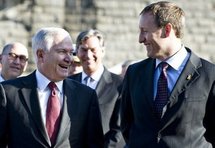Afghanistan, Iran dominate at new security forum
Michel Comte
HALIFAX, Michel Comte- The United States on Sunday urged Iran to "engage" the West at a new security forum in Canada, where allied commanders also agreed setting an Afghanistan exit date would only serve to embolden the Taliban.
"We would prefer that the Iranian regime follow through on the opportunity to engage," Ellen Tauscher, Under Secretary for Arms Control and International Security at the US State Department, told delegates in Halifax, Nova Scotia.

The United States and its negotiating partners Russia, China, Britain, France and Germany are not yet "at the point" of closing the window on dialogue, US State Department deputy spokesman Robert Wood said Friday.
The six powers have however expressed disappointment that Iran has not responded positively to a UN-backed deal to ship low-grade nuclear fuel abroad or agreed to new talks.
"If persuasion doesn't work, pressure is going to have to be the next line of action," Tauscher warned Sunday, suggesting a further round of sanctions against Iran. "I don't believe (military action against Iran) is on the table now."
Iran's disclosure in September that it is building a second enrichment plant near the holy city of Qom triggered outrage in the West, prompting world powers to threaten fresh sanctions if Tehran did not come clean on its atomic project.
Others at the inaugural Halifax International Security Forum pointed out that Tehran is already under three sets of UN sanctions for enriching uranium at a plant at Natanz and were not so quick to rule out military conflict.
Camille Grand, director of the Foundation for Strategic Research, a Paris-based think tank, said that while Middle Eastern nations were on record as being against military action on Iran, this may not the case behind the scenes.
"Off the record they are so concerned that they are contemplating any alternative to prevent Iran from becoming a nuclear weapons country," he said.
Stephen Hadley, a former US national security advisor, said Israel, which bombed a Syrian nuclear facility in 2007 over Washington's objections, "sees Iran as a bigger threat," hinting that the Jewish state's patience will not be unlimited.
In a sign of the growing tension, a commander of the elite Revolutionary Guards warned on Sunday that Iran's air defenses would annihilate Israeli warplanes if attacked.
Guards' air wing chief Amir Ali Hajizadeh was speaking at the start of five days of maneuvers aimed at honing a response to any assault on Iran's nuclear facilities.
Grand, a former advisor to France's deputy defense minister, suggested time was running out for dealing with Iran. "It's an immediate issue, not a long term issue," he said.
"Assuming there isn't another covert facility and we stop discovering one every year, the timeline is that within a year to 18 months there will be enough (materials for Iran) to build a bomb."
On Afghanistan, the Halifax summit heard from US Senator John McCain that setting an exit date would only embolden the Taliban and that an allied win was one year to 18 months away if sufficient troops are sent, as Washington mulls a surge.
US Defense Secretary Robert Gates urged the international community to ensure that aid and development projects in Afghanistan do not fuel corruption, a charge leveled by Afghan President Hamid Karzai as he counters Western claims of endemic graft within his administration.
The future of NATO and international claims on untapped Arctic oil also dominated discussions, largely behind closed doors, between Gates and top officials from Belgium, Brazil, Canada, France, Japan, Germany, India, New Zealand, and the Netherlands.
Gates announced on Friday that Washington planned to boost cooperation with Canada in the Arctic, as Russia and others eye its vast energy and mineral resources.
On Saturday top officials and shipping industry experts warned about the opening up of the Arctic to new shipping routes and discussed the probable trade frictions that would result.
Delegates at the wide-ranging forum also talked about nuclear proliferation, Pakistan, Iraq, China and North Korea, pandemics, energy security, piracy and port security, and the geopolitical consequences of the economic crisis.
------------------------------------------------------------------------------------------------------------------------------------
Image: AFP/DOD/File/Cherie Cullen.